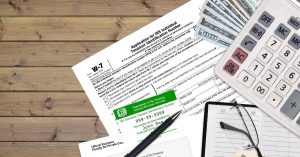Key Takeaways:
- Offshore prepaid cards are issued by foreign banks and are preloaded with money, and the user can stay anonymous
- These cards have their benefits, but they can also be used illegally by Americans trying to engage in tax evasion or fraudulent activities
- The IRS is cracking down on these illegal activities and can look into offshore prepaid cardholder information under what is called a John Doe summons
- 10 steps to take if you have an offshore card are as follows:
- Understand FBAR requirements
- Understand FATCA requirements
- Report all worldwide income
- Keep good records
- Declare your offshore prepaid card
- Consider all your tax obligations
- Use reputable providers
- Keep your account information updated
- Educate yourself on tax and financial regulations
- Work with a tax professional
More and more people are traveling and conducting business across international borders. This is why offshore prepaid cards have emerged as a convenient option. These cards help people who need to make international transactions without having to worry about exchange rates or carrying large amounts of cash. The use of these cards, however, isn’t always straightforward, particularly for U.S. taxpayers.
The IRS has intensified its efforts in recent years to track down American taxpayers who might be using offshore prepaid debit cards or offshore credit cards to conceal their assets and avoid paying taxes. These initiatives are aimed at identifying tax evaders, but many legitimate users of offshore prepaid cards have been unfairly caught up in the enforcement efforts. It is crucial to know what the law requires regarding offshore prepaid cards and how you can remain compliant.
You may be wondering, can the IRS track credit card payments? Is my offshore prepaid card legal? This guide explores the basics of offshore prepaid and credit cards, including what they are, how they work, and their advantages and disadvantages. The article also examines the IRS’s approach to offshore prepaid cards, including the potential risks of noncompliance and what Americans should do to avoid getting in trouble with the IRS.
What Are Offshore Prepaid Debit and Credit Cards?
Offshore prepaid cards are a type of payment card issued by offshore banks or financial institutions outside of the cardholder’s home country. These offshore prepaid debit cards are preloaded with a set amount of money and can be used to make purchases and withdraw cash from ATMs, just like any other prepaid card.
A primary benefit of offshore cards is that they can provide financial privacy and anonymity to their users. These cards are not subject to the same regulations as traditional bank accounts, so cardholders can use them to make purchases or withdraw cash without leaving a paper trail. This makes them a popular option for people who want to keep their financial affairs private.
Another advantage of offshore prepaid cards is their ability to help people avoid currency exchange fees and other charges when traveling abroad. Using a prepaid card from an offshore provider means travelers can often save money compared to using a traditional debit or credit card.
It is important to note, however, that offshore credit cards and debit cards can also come with higher fees and charges than traditional payment cards. Additionally, they don’t usually offer the same level of protection and security as cards issued by major banks or financial institutions. As with any financial product, it is important to carefully research and compare options to find the best offshore prepaid card for your needs.
Why the IRS Is on Alert With Offshore Prepaid Cards
The IRS continues to be on high alert when it comes to offshore prepaid cards. These cards are becoming increasingly popular among individuals who wish to hide their assets and evade taxes, even while some Americans are taking advantage of the benefits legally. Offshore prepaid cards are stored-value cards that can be used similarly to a debit or credit card, but they are not linked to the cardholder’s bank account, and they don’t require a credit check to obtain. This makes them an attractive option for individuals who want to keep their financial activity hidden from the government.
The IRS has been cracking down on offshore accounts for years, and the use of prepaid cards is no exception. The agency has been working closely with financial institutions and other government organizations to ensure individuals pay the taxes they owe. The IRS requires taxpayers to report all financial accounts located outside of the U.S. on their tax returns. Failure to do so can result in significant penalties and even criminal charges in some cases.
Offshore prepaid cards have also been linked to money laundering and other illegal activities, in addition to tax evasion. The IRS takes these threats seriously and is working diligently to curb their use. The agency hopes to encourage individuals to come forward and report their foreign accounts, rather than attempting to hide them through the use of prepaid cards or other means.
How does the IRS track down these tax evaders or fraudulent users? They use something in investigations called the “John Doe” summons, which helps them find U.S. taxpayers who go under the agency’s radar. They may have reason to believe that an unidentified John Doe is taking part in illegal behaviors. They can issue this type of summons for a prepaid card provider and request to see all financial transactions related to that John Doe taxpayer.
Tax laws can be hard to navigate for offshore accounts. Make sure you talk through your situation with a tax attorney to ensure you’re never raising a red flag with an offshore credit card.
10 Steps to Take if You Have an Offshore Prepaid Card
You can legally have an offshore credit card, even though the IRS may see these cards as a sign of fraudulent behavior or tax evasion. You might be subject to many new tax rules, and you never want to risk getting into trouble with the IRS if you have an offshore prepaid card. Here are 10 steps you can take to avoid problems and comply with the law:
1. Understand Foreign Bank Financial Accounts Requirements
One important term you need to know is FBAR. Foreign Bank Financial Accounts (FBAR) requires that you use FinCEN Form 114 to report all your foreign financial assets, including investments, trusts, accounts, and more. FinCEN is the Financial Crimes Enforcement Network. You are required to file FBAR if you have at least $10,000 in an offshore account. Failure to do so will result in hefty fines.
2. Understand Foreign Account Tax Compliance Act Requirements
You will need to report your offshore assets under the Foreign Account Tax Compliance Act (FATCA) if you meet the thresholds. The threshold for single filers is having over $50,000 in foreign asset value on the last day of the tax year or $75,000 at any time during the year, and the numbers double for joint filers. You will need to file Form 8938, State of Specified Foreign Financial Assets, if you meet the thresholds.
3. Report All Worldwide Income
The IRS requires American taxpayers to report all their offshore financial accounts and assets, if applicable. That means you need to report your prepaid card and any other offshore financial account on your tax returns. This generally applies if you are a U.S. citizen or resident alien. Report all income you earn from offshore sources, including income earned through prepaid cards.
4. Keep Good Records
Make sure to keep records of all transactions you make with your offshore prepaid card. This helps in case the IRS ever wants to know more about your finances or if you are faced with an IRS audit. Keeping accurate records also helps you stay organized and more financially healthy.
5. Declare Your Offshore Prepaid Card
Make sure to declare your offshore prepaid card under the FBAR section when filing your tax return. The IRS needs to be aware of your card so you don’t look suspicious. Also inform your offshore prepaid card provider that you are an American and that you are subject to U.S. tax regulations.
6. Consider All Your Tax Obligations
Study the tax regulations not just in the U.S. but also in the country where your offshore account is located. Some countries have tax treaties with the U.S. that can affect your tax obligations. Tax treaties are agreements between two countries that are designed to prevent double taxation and ensure taxpayers are not unfairly penalized for having assets in foreign countries. You may be able to claim credits or exemptions for taxes paid on foreign income or assets, or you may be subject to reduced tax rates on foreign income.
7. Use Reputable Providers
Only use reputable offshore prepaid card providers that are licensed in their country of operation. A reputable provider will typically have established relationships with banks or financial institutions in the country where the card is issued, ensuring the card is issued by a reliable and trustworthy source and that the provider is compliant with laws and regulations. They will also have strong security and risk management measures in place to protect your funds and personal information.
8. Keep your Account Information Updated
Always make sure to keep your offshore prepaid card account updated with your current contact information. This includes your address and other relevant details.
9. Educate Yourself on Tax and Financial Regulations
You always need to stay up to date with changes in tax law to ensure you stay compliant. This is especially important when you have offshore financial accounts and assets. You never want the IRS to flag you as a potential threat, which could lead to extreme penalties and consequences.
10. Work With a Tax Professional
Never put your standing or finances at risk. You may think you’re doing everything properly to report your offshore assets, but it’s always best to talk to a tax expert. These professionals understand the law, including the latest changes, and how it impacts you and your situation.
Americans with offshore prepaid cards need to be careful to comply with IRS rules and regulations to avoid trouble with the law. Follow these steps to avoid problems and stay in good standing when you have foreign assets. Consult with a tax expert when you’re not sure about your tax obligations.
Contact Silver Tax Group With Questions About Offshore Prepaid Cards
Offshore prepaid debit and credit cards can be a useful financial tool for individuals who travel, live abroad, or hold offshore financial accounts. They offer convenience, security, and flexibility for managing finances outside of the U.S. It is important to note, however, that these cards can have tax implications. Failure to report them to the IRS can lead to penalties and legal trouble.
Make sure to consult with a tax professional to ensure you are meeting all reporting requirements if you hold an offshore prepaid card of any kind. Keep accurate records of any transactions made with the card and report any income earned from it on your tax return. Stay transparent and responsible with your financial dealings and you can avoid legal or financial repercussions in the future. It is crucial to weigh the benefits and potential drawbacks before taking part in offshore prepaid cards.
The team at Silver Tax Group is ready to help you navigate these complex scenarios. We can talk with you about your goals and how they impact your taxes. We understand how U.S. laws impact foreign assets and accounts. Our attorneys can also help you with general consulting, tax defense, IRS audits, emergency tax services, and much more. Reach out to Silver Tax Group to speak to a tax expert about offshore prepaid cards and how to stay in good standing with the IRS.








